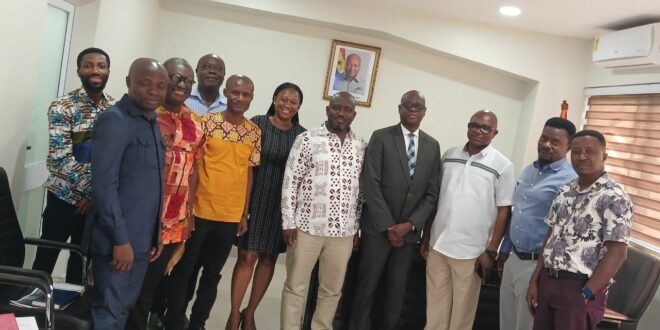The Chief Executive Officer of GRATIS Foundation, Dr. Isaac Adebesah, has joined key national and international stakeholders in a high-level meeting to deliberate on Ghana’s participation in the United Nations Industrial Development Organization’s (UNIDO) Program for Country Partnership (PCP).
The meeting which was held on Thursday, May 8, 2025, brought together the Country Director of UNIDO, the Chief Director of the Ministry of Trade and Industry, and the Director of Agribusiness, among others.
The dialogue focused on fast-tracking Ghana’s inclusive and sustainable industrial development through the PCP, UNIDO’s flagship initiative that aims to align industrial growth strategies with national development goals. The PCP emphasizes strategic investment, value addition, and multi-stakeholder collaboration as tools to stimulate industrial transformation and economic growth.
Dr. Adebesah reaffirmed the GRATIS Foundation’s strong commitment to supporting Ghana’s industrial agenda through innovation, technical training, and the development of robust value chains.
According to him, GRATIS Foundation is well positioned to contribute positively in ensuring the successful implementation of the Program for Country Partnership
“As a key player in the industrial ecosystem, GRATIS is well-positioned to contribute its expertise to ensure the successful implementation of the PCP in Ghana,” he said.
The PCP model is uniquely structured to promote sustainable industrialization by building synergies among government, development partners, and private sector actors. It not only mobilizes resources for high-impact projects but also fosters policy coherence, institutional strengthening, and investment in priority sectors such as agro-processing, manufacturing, and renewable energy.
Aligned with Ghana’s development priorities, the PCP supports the country’s efforts to achieve the Sustainable Development Goals (SDGs), particularly SDG 9, which promotes industry, innovation, and infrastructure. Through this initiative, UNIDO seeks to create inclusive growth opportunities, boost employment, and enhance competitiveness in local industries.
Source: Ghanaweb.mobi
 Home Of Ghana News Ghana News, Entertainment And More
Home Of Ghana News Ghana News, Entertainment And More





